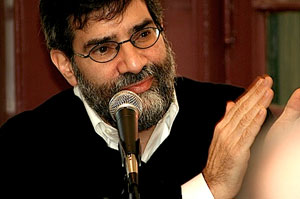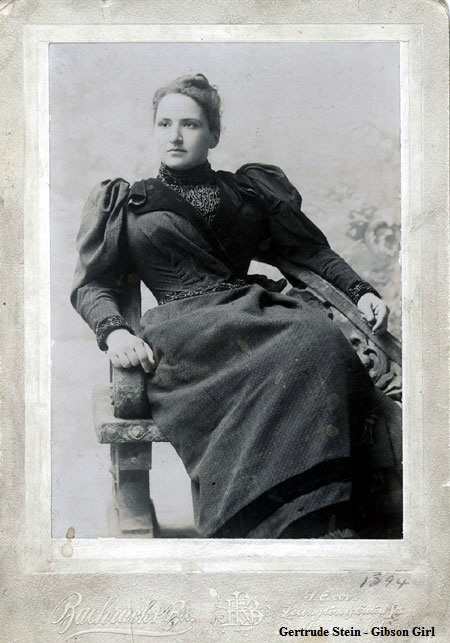|
Online and Thriving
Gertrude Stein, are you
listening? Over 35,000
people worldwide are
enrolled in a course on
modern poetry that
pivots on your work.
MOOC MANIA & MODERN POETRY
In September 2012,
Coursera, a Massive
Open Online Course
(MOOC) company offering
free online courses
taught by some of the
best teachers in the
United States, offered
a ten-week Modern
Poetry course developed
and led by University
of Pennsylvania
professor Al Filreis.
The course begins with
Emily Dickinson and
Walt Whitman but
quickly (week 2) moves
to such poets
influenced by Dickinson
and Whitman as William
Carlos Williams, Allen
Ginsberg, and Rae
Armatrout. While week 3
ventures into the
Imagism of Ezra Pound,
Pound's acolyte
H.D. (Hilda Doolittle),
and a more
comprehensive look at
Williams, week 4 spends
significant time on
Stein while showing the
edges of
experimentalism with a
look at some extreme
experimenters like the
Baroness Elsa von
Freytag Loringhoven and
Tristan Tzara.
The Steiny Road Poet,
who is actively
participating in the
ModPo course,
interviewed the
gregarious but busy Al
Filreis by telephone on
November 1, 2012.
Wasting no time, the
Steiny Poet asked the
professor to talk about
the role Stein plays in
teaching this course.
The professor laughed
and said, "Wow,
what a question."
Then, he
continued,
GETTING LANGUAGED BY MEETING STEIN
"Stein is the
first moment in our
course when students
are confronted with the
stark realization that
semantic
meaning—that
storytelling, that
narrative, that
description and
depiction are not going
to be helpful. When you
read the experimental
writing of H.D. or
William Carlos Williams
or before that,
Dickinson, you can
always cling to the
hope that you can get
the meaning from
it—the semantic
meaning, the
story—but when
you get to Stein you
are finally confronted
with an experimental
way of presenting
language."
Filreis added that for
most students of modern
poetry, Stein is the
first time as adults
that they have ever
confronted this
emphasis on language
versus narrative
meaning.  He clarified by saying it's the first time, except for listening
to baby babble, that these students have
confronted language without semantic meaning.
And yes, Dear Reader, he acknowledged that
Stein's critics and detractors "accused her of
doing babytalk." He says this acknowledgement is
not meant to "condescend" to Stein. His point is
"once we move out of babyhood and start putting words together we are
socialized to mean denotative, descriptive, semantic things with our words. We
lose the pure joy of expression without referential or depictive meaning." He clarified by saying it's the first time, except for listening
to baby babble, that these students have
confronted language without semantic meaning.
And yes, Dear Reader, he acknowledged that
Stein's critics and detractors "accused her of
doing babytalk." He says this acknowledgement is
not meant to "condescend" to Stein. His point is
"once we move out of babyhood and start putting words together we are
socialized to mean denotative, descriptive, semantic things with our words. We
lose the pure joy of expression without referential or depictive meaning."
What does this mean relative to how the course turns on the introduction of
Stein's work? "This is a great moment in the course where students are
confronted with this alternative way of seeing language. It's a revelatory
moment."
FIRST THE SOFTSELL ON STEIN
Here the Steiny Poet interrupted the good professor by saying she noted that he
introduced Stein as gently as possible taking a political position to sell the great
Modernist's work. Filreis said he didn't know if his approach to teaching was
political. Then he interrupted himself to consider this word saying "when we
say political we jump to the highest level of discussion. Let's try a couple of
other words first. Pedagogically, I have to soft sell it [Stein's work]. I have to
lower expectations. I have to say—it's going to be really hard. I don't know if we
can do this— because there are a lot of detractors lying in wait."
Filreis has been through teaching Stein many times and he knows the folded
arms he is up against. He said he needs to help people relax, but also convince
them to work harder. He wants his students to become better "linguistic
citizens" and to do at least 50% of the work. He makes this argument using
what denizens of the world expect of newspapers. "We expect that our
newspaper delivers to us something that is ready to understand and doesn't
require any work. The newspaper does 90% of the work and we do 10%." Off
the cuff, Filreis suggested, but not with certainty, that reading Stein requires 75
% effort from the student. He said of this comment, "that's not fair to Stein but
you know what I mean."
WE ARE ALL IN THIS TOGETHER
One of the aspects of ModPo that particularly attracted the Steiny Road Poet is
how Stein and contemporary poetry would be taught. Filreis said that he
"hoped one of the charms of ModPo is the mode" of teaching this course. He
calls this method meta-pedagogy. "The course has to be taught in a way that it is
commensurate with the material." He offered this "far afield" example, saying if
his job were to teach the history of Fascism in order to dissuade students from
becoming Fascists and he taught the course by lecturing, telling his students
what to think, his teaching style would be incommensurate with the
authoritarianism that gave rise to Fascism in the first place.
"There's something we might call an anti-Fascist pedagogy that even in a MOOC
induces a student to work hard and grapple with material they don't get [and]
with a teacher who is not lecturing but encouraging discussion. The reason
ModPo has caught on is that people are discovering the mode of the course is
exactly the point we are suppose to learn about the poetry." Yes, Dear Reader,
this is where the Internet and social networking come into play. Gertrude
Stein's promotion of "talking and listening" is translated and facilitated by
online discussion chat rooms, tweets, and Facebook updates. ModPo students
worldwide talk to each other, the professor, and his teaching assistants through
these methods.
Numerous live web broadcasts for the purpose of answering questions all help
to make to make ModPo intimate, as if a student was sitting at the table with
professor Al and his TAs whose preferences and personalities the students
come to enjoy in their own educational reality show. Recently when TA Ali
Castleman wasn't at the table for a couple of videos and a live webcast, the
discussion forums were buzzing about where she was and would she be coming
back.
Week five of the syllabus deals with antimodernists including Communist poets,
Harlem Renaissance poets, and formalists including Robert Frost, Richard
Wilbur, and X. J. Kennedy. Weeks six and seven move back to the
experimentation of Beat writers (e.g. Allen Ginsberg and Jack Kerouac) and the
New York School (e.g. Frank O'Hara and Kenneth Koch). From week six,
Gertrude Stein's influence starts to emerge until more clear influence surfaces
in the eighth, ninth, and tenth weeks where L-A-N-G-U-A-G-E, chance,
conceptualism, and unoriginality poetry is presented. Prof Al said in his
introduction to the course that students should fasten their seatbelts in order to
ride out the storm these contemporary writers stir up.
When asked how many students are staying with the course, Filreis said, "It is
hard to tell but of the 35,000 registered for the course, probably about 20,000
connected with the course in any significant way ever. Probably about 10,000 at
certain times have been active. I would say there is a core of 6,000 who are
grappling with it every day. Most folks want to spend a day of maybe three to
four hours and that's fine, but I'm not counting them in that 6,000 who are
living breathing it."
Filreis said he plans to teach this same course again in September 2013. There
may be a few poems that are different but essentially it will be the same as
ModPo 1. He has been teaching and tweaking this class for the University of
Pennsylvania for some years and along the way he has learned a lot about how
to bring resistant students into the fold. The live class too has its online aspect
but the for-credit course with live private access to the professor has a slightly
different syllabus and a price tag of something under $2,000. ModPo 1 will be
open to those who registered by November 19, 2012 and until ModPo 2 comes
online. Those who already took the course will be encouraged to take it again
and help others experiencing it for the first time.
UNBUTTONING STEIN
So what did the Steiny Road Poet learn about Stein? She learned that it is
possible to do a close read on difficult poems like Tender Buttons, that the
collaborative approach gathers energy and excitement. Take, for example,
A LONG DRESS.
What is the current that makes machinery, that makes it crackle, what is the
current that presents a long line and a necessary waist. What is this current.
What is the wind, what is it.
Where is the serene length, it is there and a dark place is not a dark place, only
a white and red are black, only a yellow and green are blue, a pink is scarlet, a
bow is every color. A line distinguishes it. A line just distinguishes it. —
Gertrude Stein from "Objects" in Tender Buttons

The ModPo discussion between the TAs and professor yielded such ideas as:
the machinery is a sewing machine, maybe in a dress factory like the Shirtwaist
Triangle Factory. This factory burned down in 1911. Stein wrote Tender Buttons
in 1912.
GO WITH YOUR TRIBE TO LOVE POETRY NOW
Al Filreis said he wants his student to walk away from ModPo with these three
ideas:
First and most importantly, to see value in collaborative learning. He hopes his
students will "proselytize" this idea wherever they go.
Second to look hard at the language we use and "go beyond their fathers'
sayings as Frost puts it." Filreis wants his students to stop assuming but work
through the language to discover what is there.
Lastly to love modern poetry and to read more of it.
The Steiny Road Poet has always said that when you go into the woods, go with
your tribe. And she knows collaboration has it pitfalls but for learning how to
navigate modern and contemporary poetry, what professor Al Filreis offers in
his ModPo curriculum has been an enriching experience.
While not every poet is there (e.g. just a whiff of Wallace Stevens and no
Marianne Moore), consider this forum a toolbox for building your own house of
poets and poetry. So Gertrude Stein, are you finding sanctuary in these new
buildings?
|